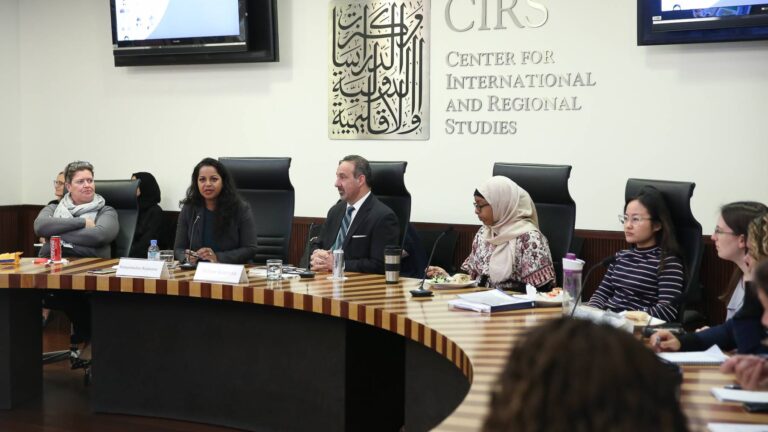American Studies, Dialogue Series, Regional Studies
Western Higher Education in Global Contexts

Mohanalakshmi Rajakumar is a Qatar-based novelist and community course instructor at VCUarts Qatar who writes on topics related to gender, race, and pedagogy. On February 13, 2019, she presented a CIRS Focused Discussion, “Western Higher Education in Global Contexts,” in which she explored the topic of international branch campuses (IBCs)—such as Georgetown University in Qatar and other universities in Education City—and their growing popularity and impact on international development in education. She recently edited a book by the same title, published in 2018, which examines global perspectives on the internationalization of American higher education practices in Europe, Asia, and the Middle East.
The premise of the IBC is the agreement between a national entity and a US-based institution that students will earn the same degree they would receive from the main campus, Rajakumar explained. Due to this arrangement, IBCs typically do not offer professors specialized training in cultural sensitivity because, “If it is the exact same degree, then there would be no additives, no preservatives, nothing at all changed,” she said. Students are also not oriented to the unique nature of studying at an IBC, which may vary drastically from their previous educational training.
Rajakumar shared a case study with the audience to show the importance of understanding the overlapping influences of cultural norms and diversity of values in multicultural classrooms. Such cases are a follow up to the larger project of the book, intended to feature the “brass tacks and lived realities for the people doing the teaching and learning” in IBCs, she said. According to Rajakumar, the main themes within the case study were conflicting norms about timeliness and people’s differing attitudes about authority figures in intercultural settings.
“This is a case that looks at authority; who has authority, who is allowed to question the authority, and the ways in which power circulates in a classroom.”
The central conflict in the case raised the critical question of who is in charge and what is open to negotiation in a university classroom. “Some people think rules are rules,” she explained. Others feel that, “Rules are rules, but they shouldn’t apply to ‘me’ because ‘I’ have this exceptional circumstance.” A one-size-fits-all model for teaching in international contexts is impossible to implement, she said, because students may find faults with their syllabi depending on the importance of the course to their major. Other factors also influence classroom behavior including gender, ethnic background, and personality types; therefore, there can often be conflict between faculty and students, as well as among students themselves.
Ultimately, Rajakumar explained, “This is a case that looks at authority; who has authority, who is allowed to question the authority, and the ways in which power circulates in a classroom.” She concluded by noting that an unfortunate reality of Western education today is that it is not molded to fit various cultural contexts. Additionally, professors and students at IBCs are not prepared for the unique learning process they are undertaking. “No matter whether it was Russia, Japan, Qatar, Lebanon—across all of our research sites, there was little to almost no training given to faculty for their particular cultural setting,” she said. IBCs seem to be perpetuating a Western narrative in this respect, and cultural awareness training is necessary for their future success.
Article by Khansa Maria, CURA Publications Fellow
Mohanalakshmi Rajakumar is a novelist and educator with a PhD in English Literature. Her work has been published in a variety of peer reviewed journals and books including Gender, Teaching American Literature, and South Asian Review, among others. Rajakumar has also been recognized for her work as a novelist. Her contemporary romance, Love Comes Later, won the Best Indie Book Award for Romance in 2013, and her coming-of-age novel, An Unlikely Goddess, earned her recognition as a finalist in the SheWrites New Novelist competition in 2011. Her edited volume, Western Higher Education in Global Contexts, contributes to the scholarship on the project of implementing and expanding US-influenced curricula in the Middle East and Asia.